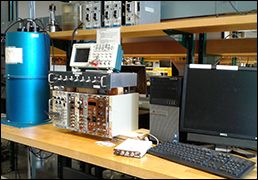Description

Relativistic kinematics experiment equipment.
The purpose of this experiment is to demonstrate the existence of a speed limit on the motion of particles by measuring the speed of cosmic-ray muons, and to demonstrate the relativistic dilation of time by comparing the mean life of muons at rest and in high speed motion. The existence of an absolute limit, c, on the speed of particles is demonstrated by a measurement of the times of flight of cosmic-ray muons between scintillation counters in the laboratory. The mean life of muons at rest is then determined from a measurement of the distribution of radioactive decay times of muons that stop in a large plastic scintillator.
Given their measured short mean life, the measured speed limit, and the large distance they travel from their places of production high in the atmosphere, it is apparent that the muons in flight live much longer relative to an observer in the laboratory than muons at rest, in conformance with the predictions of relativistic kinematics.
Lab Guide
The Speed and Mean Life of Cosmic-Ray Muons Lab Guide (PDF)
References
Rossi, Bruno. “Interpretation of Cosmic-Ray Phenomena.” Reviews of Modern Physics 20, no. 3 (1948): 537-583.
———. Chapters 1 through 8, plus Appendices, Bibliography and Index in High-Energy Particles. New York, NY: Prentice-Hall, 1952, pp. 1-569.
———. Cosmic Rays. New York, NY: McGraw-Hill, 1964.
Frisch, D. H., and J. H. Smith. “Measurement of the Relativistic Time Dilation Using mu-Mesons.” American Journal of Physics 31 (1963): 342-355.
Hall, R. E., D. A. Lind, and R. A. Ristinen. “A Simplified Muon Lifetime Experiment for the Instructional Laboratory.” American Journal of Physics 38 (1970): 1196-1200.
Griffiths, David. Introduction to Elementary Particles. New York, NY: Wiley, 1987, chapter 1, pp. 1-51. ISBN: 9780471603863.
———. “Theory of Weak Interactions and Muon Decay.” Chapter 10 in Introduction to Elementary Particles. New York, NY: Wiley, 1987, pp. 301-309. ISBN: 9780471603863.
Perkins, Donald H. Introduction to High Energy Physics. Cambridge, UK: Cambridge University Press, 2000, p. 213. ISBN: 9780521621960.
A nice comparison positon spectra from muon (three body) and pion (two body decays).
Selected Resource
Stanford Linear Accelerator High Energy Cosmic Rays: A very nice overview of current cosmic ray research by Prof. Todor Stanev.










